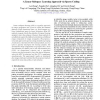53 search results - page 4 / 11 » A Non-convex Relaxation Approach to Sparse Dictionary Learni... |
AAAI
2011
12 years 6 months ago
2011
Variable selection problems are typically addressed under a penalized optimization framework. Nonconvex penalties such as the minimax concave plus (MCP) and smoothly clipped absol...
ICCV
2011
IEEE
12 years 6 months ago
2011
IEEE
Linear subspace learning (LSL) is a popular approach to image recognition and it aims to reveal the essential features of high dimensional data, e.g., facial images, in a lower di...
CVPR
2008
IEEE
14 years 8 months ago
2008
IEEE
Sparse signal models have been the focus of much recent research, leading to (or improving upon) state-of-the-art results in signal, image, and video restoration. This article ext...
ICASSP
2010
IEEE
13 years 4 months ago
2010
IEEE
The enhancement of speech degraded by non-stationary interferers is a highly relevant and difficult task of many signal processing applications. We present a monaural speech enhan...
ICML
2009
IEEE
14 years 7 months ago
2009
IEEE
Sparse coding--that is, modelling data vectors as sparse linear combinations of basis elements--is widely used in machine learning, neuroscience, signal processing, and statistics...

